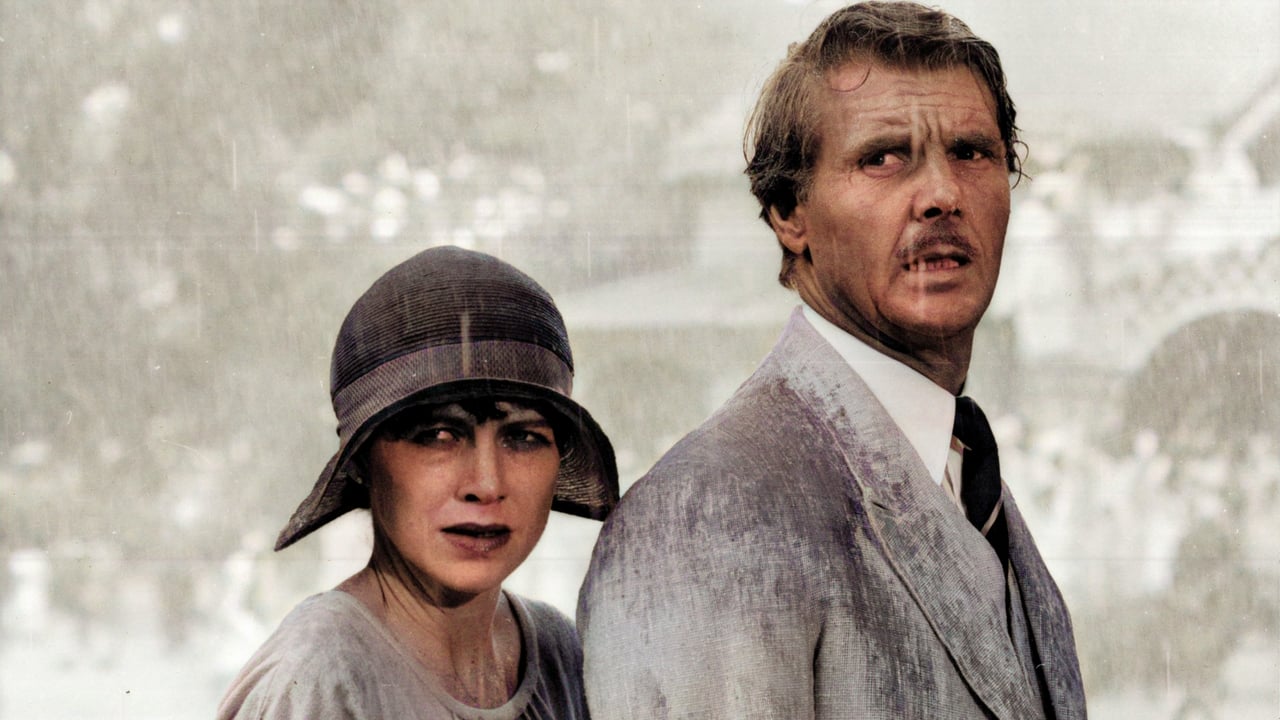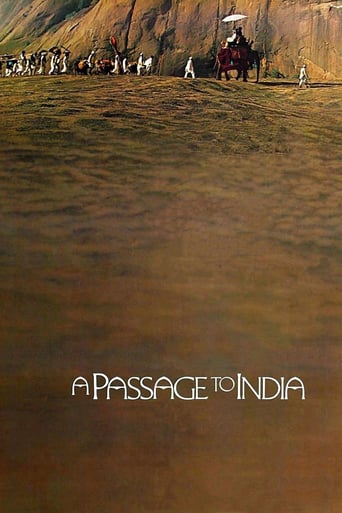

It's been quite some time since I've seen this film but finally got it out for another look. The word I can best use to describe it is "Splendid" Considering it was made in 1984, it's really hard to believe. The setting, costumes, and style of speaking really has you believing this film was shot in the 1930s or 40's. But that is the style of David Lean. From the story line, direction, and style of filming, this is definitely a David Lean film. A lot of people may not like it because of it's old fashioned style, but it is indeed a splendid film. No bombs, no special effects, no dismembered limbs, just a story told on film. Splendid.!
... View MoreRewatching A Passage to India after a few years, it is not one of my favourite David Lean films like Lawrence of Arabia, Great Expectations, Bridge on the River Kwai, Brief Encounter and Oliver Twist are, but for a swansong of a great director (one of my personal favourites actually) it's a very good one, but I do remember liking it more on first watch.A Passage to India is not perfect, it ends anti-climactically and parts feel overlong and stretched with some drifting storytelling. This is also a rare case where the normally great Alec Guiness felt wasted and miscast, he never convinces in his very underwritten role and the performance is filled with uncharacteristically over-stated mannerisms.However, Lean directs superbly and the film is lavishly made with typically luscious cinematography, lavish period detail and some of the most gorgeously evocative scenery of any Lean film (in a filmography of films filled with gorgeous scenery). Maurice Jarre's music score has been criticised for being an ill-fit, for me while lacking the Indian flavour and a tad too jaunty in the credits it is sumptuously scored, soaringly epic, sounds glorious and evokes a lot of emotion. The script is literate and very beautifully written, capturing the essence of Forster's writing while not feeling overly wordy or heavy, while the story is rich in atmosphere and explores the important themes of colonialism, relationships between cultures and the British Empire and its imperialism in a subtle but powerful way.The film has been criticised for its pacing, and while there are a few draggy moments due to a few scenes feeling too stretched the main reason for the deliberate pacing was most likely for the viewer to soak up the setting and its atmosphere, A Passage to India does this brilliantly (and this is true for Lean's work in general as well). The part covering the trial is mostly fantastic but could have been longer, and the characters and their interactions are fascinating and well-realised. The acting is truly excellent, Peggy Ashcroft rightfully won an Oscar for her divine performance (especially in the temple scene) and Judy Davis is every bit her equal in a difficult but impulsively and movingly played performance. James Fox is remarkably thoughtful and sympathetic in his role, and Victor Banerjee gives his caricature role a real expressivity.Overall, a very good swansong from Lean and a very good film. 7.5/10 Bethany Cox
... View More1984's "A Passage to India" is a visually stunning film and a haunting story of the clash of two cultures. Based on E.M. Forster's novel, it takes place in late '20s India, under British rule. Two British women, Mrs. Moore (Dame Peggy Ashcroft) and Adela Quested (Judy Davis), travel there, Mrs. Moore to see her magistrate son (Nigel Havers), who is engaged to Adela.They want to see the country and meet the Indian people and are frankly surprised that there isn't more mixing of the cultures and people. One night, while visiting a mosque, Mrs. Moore meets the friendly, westernized Dr. Aziz. He invites her and Adela on an outing to the Malabar caves. While there, an incident occurs which becomes a cause celebre and divides the already divided British and Indian cultures.David Lean's film is fascinating on many levels: The breathtaking way he captures the atmosphere of India as well as the period, the magnificent cinematography, and the examination of the beliefs and mores of the time.Judy Davis gives a brilliant performance as the sexually-repressed Adela, who becomes frightened of her awakening feelings just as she vacillates about her coming marriage. She is matched by Victor Banerjee as Dr. Aziz, an attractive, friendly man whose life becomes a nightmare. Peggy Ashcroft gives a beautiful performance as the evolved Mrs. Moore. James Fox and Alec Guinness (in a role which was largely cut) round out the excellent cast.David Lean was one of the world's greatest filmmakers, capable of sweeping epics like Lawrence of Arabia and intimate stories such as Brief Encounter. He has inspired filmmakers such as Steven Spielberg, and his reputation as a true artist is richly deserved. Known for his acute sense of time and place, A Passage to India is another example of his talent and will not disappoint.
... View MoreI enjoyed the film but not the story. I have been to India many times for work and I am fascinated by its history. I realize this isn't a historical film but it did capture the time of the Brit Raj rather well. I also saw some of the typical Western Traveler that gets caught up in the social views and their feeling of pity for the Indian. No need they are a strong people. Anyhow it bugged me that they used Alec Guiness for Godbole. I kept thinking WTH is he doing. He added nothing and it could have been done much better by any of Bollywoods top tier. I just couldn't get over his being there. And the scene at the caves was painful the acting forced. I still have no idea what she was doing they paid no real attention to flesh out what went on with her. A missed opportunity. Anyhow, it is a good movie to see what life was like at the time but the story and directing was pretty bad. Not to mention Alec in his creepy scenes.
... View More